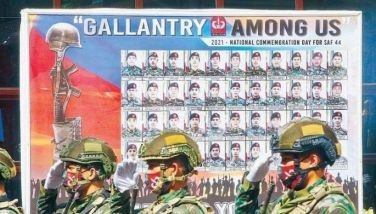Combination of arms and aid led to Abu Sayyaf downfall – Ebdane
SINGAPORE (AP) — Top leaders of the al-Qaeda-linked Abu Sayyaf group were killed through a combination of sustained military operations and development aid, Defense Secretary Hermogenes Ebdane Jr. said yesterday.
Months of community dialogue, medical assistance and infrastructure projects on the southern Philippine
“The world witnessed the fall of the elusive leaders of the Abu Sayyaf group in several military encounters,” Ebdane said in an address to the Shangri-La Dialogue, a meeting of regional defense chiefs in
“What the world did not see were the operations that applied the combination of hard and soft approaches to addressing terrorism,” he said.
The military launched a major offensive last August on volatile Jolo, about 960 kilometers (600 miles) south of
Abu Sayyaf chieftain Khaddafy Janjalani and his presumed successor, Abu Sulaiman, were both killed in the operations, part of a campaign that began in 2002 to apply a combination of humanitarian work and military tactics to win over the local Muslim population and marginalize militants.
The battle setbacks have driven more than 300 Abu Sayyaf remnants, split into at least six factions, along with a few Indonesian terror suspects, deeper into the jungle and provided a months-long respite from violence in Jolo’s townships.
Ebdane said heightened interaction between the government and local communities constricted Abu Sayyaf’s previously unhampered room for activity and produced intelligence on the location of top leaders.
Military operations on land and control of the surrounding seas – the rebels’ traditional route of escape – further strangled the group’s operating space, he said.
“It is this combination of developmental and military tools that led to the fall of the top leaders,” Ebdane said.
Despite its recent setbacks, Abu Sayyaf has staged occasional attacks seeking to reassert itself as a terror force. In April, one faction beheaded seven men they had kidnapped and had the heads delivered by civilians to the doors of two army detachments on Jolo.
- Latest
- Trending




























